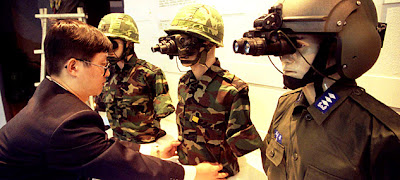
In the James Bond novels and films, it fell to technical expert Q to invent the gizmos and cunningly concealed weapons that helped the British spy cheat death and save the world.
From a biometric keyboard to blast-proof curtains, the inventions on display in the real world this month came from five technology firms in the final round of the Global Security Challenge, a competition to identify the world's most promising security start-up.
"I'm sorry that Q wasn't at the judging table," said Sir Richard Dearlove, who from 1999-2004 was the real-life C – the code-name given to the head of British spy service MI6.
But on a more sombre note, he told participants: "We are faced with complex new threats to society... We must also contend with the possibility that many new technologies have a dark side and may be used against us."
According to Venture Business Research, which provides intelligence and research on private companies in high-growth sectors, more than $US6 billion ($6.9 billion) of investment has flowed into private security and defence businesses in the US and Europe so far this year, up from some $3.5 billion in the whole of 2006.
Spotting that potential, MBA students at London Business School staged the inaugural security challenge last year, when British start-up Ingenia Technology took the $10,000 first prize for an anti-counterfeit laser-scanning device.
Such was interest in the competition that the US Government's Technical Support Working Group raised this year's prize to $US500,000 ($573,000).
Industry players, private equity groups and venture capital firms all listened closely to the entrants' pitches, in an event highlighting the challenges facing young companies in turning bright ideas into commercial ventures.
Night camera
The winning entry was from NoblePeak Vision Corporation, based in Wakefield, Massachusetts and founded in 2002 as a spin-off from Bell Laboratories: its night-vision camera can pick up short-wave infrared (SWIR) light invisible to the eye.
The black-and-white night-time images are much sharper than those generated by thermal video cameras, and applications include battlefield vision, protecting buildings and helping car drivers avoid collisions at night.
Other finalists included biometric technology to recognise keyboard users by their typing behaviour – sparing users from memorising dozens of passwords – and a hand-held device for testing exposure to nerve agents.
By scanning the eye, it can also detect carbon monoxide or cyanide poisoning, or identify trauma to the brain.
Another company offered new high-strength fibres that get fatter when stretched and are highly resistant to blast damage, offering potential as special curtains to catch flying window glass in an explosion.
Also in contention was a "face synthesis" device to create up to thousands of images from one photo, predicting how the subject will look in different lighting conditions, from different angles and with varying expressions or facial hair.
Biometrics
A poll of investors, experts and industry players at the event identified biometrics and protection of critical infrastructure as key growth areas in coming years.
But Lee Buchanan, a former assistant US navy secretary who now advises US private equity group Paladin on investments, said the crucial point was to deliver more than just security.
"Typically a company or an organisation is going to be much more interested in a security technology which also has a non-security yield – an increase in productivity, an increase in the distinction of its own product," he said.
Competition judges praised the calibre of the entries but found some of them lacking in key areas.
The keyboard developer was targeting an "incredibly crowded area" of the IT security market and had not undertaken much peer review – a criticism shared by the face recognition system.
The fibre-maker was praised for its innovation, but found wanting in its delivery strategy. The eye scanner's makers had underestimated regulatory challenges and the difficulty of building a robust product.
Security companies needed a good business model, Mr Buchanan said, but added: "I don't see very many of those out there."
Mr Buchanan identified sensor technologies for explosives, bioweapons and nuclear materials as one of the biggest gaps in the market.
'More attractive than clean energy'
While this year's $6 billion investment in the sector has been swollen by some big one-off deals, Venture Business Research director Douglas Lloyd said European interest had markedly increased, and a series of dedicated security funds had started to emerge.
"I expect investment activity in this sector to remain buoyant. And I also see this as a more attractive sector, as many do, than clean energy," Mr Lloyd said.
"The failure rate of security businesses is much lower than clean-tech ones and, as importantly, the capital investment required to build a successful security business is also much lower."
With politicians and intelligence chiefs warning of a decades-long struggle to come against al-Qaeda, security looks set to remain a growth industry.
Paladin's Mr Buchanan rejected the charge often levelled by critics that the defence and industrial establishment has a vested interested in talking up the dangers.
"I'm not sure we can over-emphasise the threat. It's going to be with us a very long time. It is very deep and abiding. I don't think we're nearly at the point where the hype exceeds the need," he said.
Source: http://www.news.com.au/technology/story/0,25642,22829922-5014108,00.html

No comments:
Post a Comment